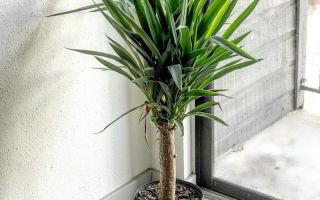Content
- 1 What does yucca look like and where does it grow in nature?
- 2 Chemical composition
- 3 What is useful and what properties does Yucca Shidigera, filamentous
- 4 Application in traditional medicine
- 5 Application in cosmetology
- 6 Contraindications and harm of a yucca houseplant for humans
- 7 Is yucca dangerous for cats
- 8 Collection and procurement
- 9 Conclusion
The benefits and harms of room yucca deserve close attention. The plant is able not only to decorate the home environment, but also to help in the treatment of certain diseases.
What does yucca look like and where does it grow in nature?
Yucca is an evergreen plant from the Asparagus family. It is represented by numerous wild and indoor varieties. In home breeding, the undersized Shidigera yucca, as well as filamentous, are especially popular.
The plant has a thick, woody stem, straight or branched, and pointed lanceolate leaves gathered at the ends of branches or trunk. In June, it forms large bell-shaped flowers of a white hue, forming drooping panicles. The fruits ripen at the end of September and are a fleshy berry or box with black seeds.
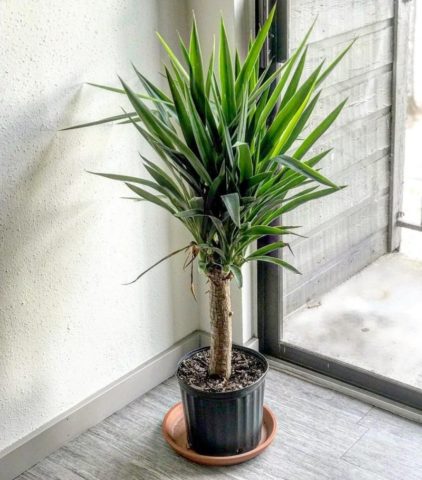
The tropics and subtropics of Central and North America, Mexico, Guatemala and El Salvador are considered the birthplace of culture. Yucca is artificially cultivated in the south of Europe and the Caucasus, in Uzbekistan and in the Crimea, in Algeria and in India.
Does yucca grow in Siberia
The plant is thermophilic, but some varieties are able to withstand cold snaps down to -25 ° C. In particular, the gray yucca can be cultivated in the middle lane, in Altai and even in Siberia. But at the same time, the culture requires mandatory insulation for the winter; it is best to keep it in a closed greenhouse.
Indoor yucca varieties can grow in almost all regions. In Siberia, an evergreen tropical flower only needs sufficient light in winter and good moisture.
Chemical composition
Yucca has not only decorative but also medicinal properties. The latter are due to the rich chemical composition of the plant. The leaves and flowers contain:
- saponins and anthraquinones;
- mucus;
- enzymes and enzymes;
- tigogenin and antioxidants;
- sugars and steroids;
- vitamins B and A;
- calcium and potassium;
- vitamin C;
- zinc and selenium;
- iron;
- folic acid;
- riboflavin and niacin;
- tocopherol;
- copper and magnesium;
- pantothenic acid;
- vitamin K.
For medicinal purposes, it is allowed to use all parts of the plant. The leaves, roots and flowers of room yucca have beneficial properties.
What is useful and what properties does Yucca Shidigera, filamentous
Indoor flower helps with many diseases. In particular, the plant:
- has anti-inflammatory and anti-fungal properties;
- has a decongestant effect;
- lowers cholesterol and strengthens the walls of blood vessels;
- accelerates metabolic processes;
- improves condition with gastritis, stomach ulcers and other gastrointestinal diseases;
- relieves allergy symptoms;
- has a mild laxative effect;
- strengthens joints and teeth;
- normalizes blood glucose levels;
- supports the health of the muscular system;
- improves immune resistance.
You can take yucca-based products to restore visual acuity and to strengthen the retina.
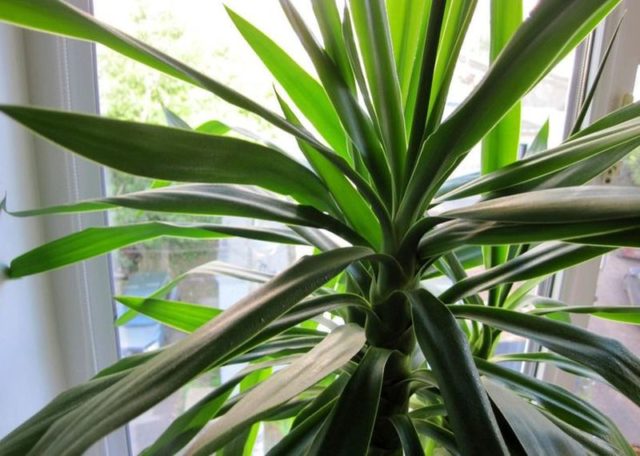
Men can use decoctions and infusions of the plant to strengthen the heart and normalize sexual functions. Indoor flower normalizes the reproductive system and prevents the development of inflammatory processes.
Why are yucca flowers useful?
Indoor yucca flowers are valued primarily in cosmetology. Funds based on them help to eliminate wrinkles, slow down skin aging and maintain its elasticity. The beneficial substances in the buds are responsible for the good functioning of the immune system.
Flowers can be used for culinary purposes. They are added to the first and second courses as a seasoning. Yucca can replace green beans.
Healing properties of yucca filamentous for women
Healthy yucca has a beneficial effect on the endocrine system and promotes the production of sex hormones. This allows the plant to be used in the treatment of infertility. The indoor flower is used to normalize the menstrual cycle in women and to eliminate the unpleasant symptoms of menopause. Yucca is beneficial in the treatment and prevention of inflammatory processes in the reproductive system.
Application in traditional medicine
The medicinal properties of yucca are used in the treatment of skin, joint, inflammatory and metabolic diseases. Traditional medicine offers proven recipes for decoctions and infusions.
With arthritis
A decoction of the root of the plant brings a good effect for joint ailments. The tool is prepared as follows:
- the raw materials are crushed in the volume of a large spoon;
- pour the root of 500 ml of water;
- boil over low heat after boiling for 15 minutes;
- removed from the stove and insisted for about an hour.
The filtered broth is consumed three times a day, half a glass.
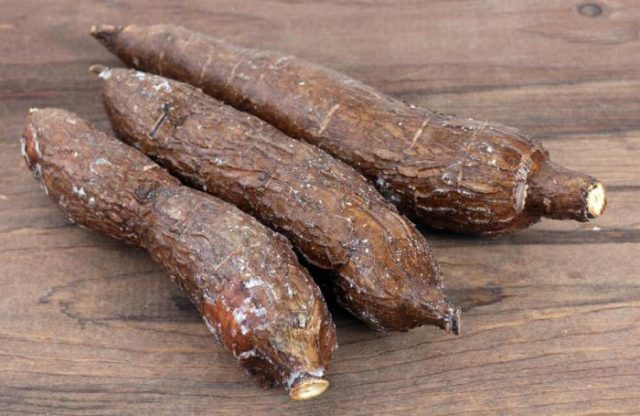
For skin diseases
For eczema and psoriasis, you can make homemade yucca leaves ointment. The recipe looks like this:
- the leaves of a houseplant are washed and finely chopped;
- in a volume of 10 g, raw materials are mixed with 100 g of baked lard;
- the composition is simmering in a water bath for 6 hours;
- filter the mixture through cheesecloth.
The cooled thick product is applied to the affected areas. The procedure is allowed three times a day.
With gastritis
The plant has a calming effect and helps to restore irritated mucous membranes. For gastritis and chronic stomach ulcers, prepare the following decoction:
- 10 g of leaves are crushed and filled with 500 ml of water;
- bring the mixture to a boil and immediately remove from heat;
- insist under the lid until it cools completely.
You need to consume the broth in a large spoonful three times a day. It is advisable to take it on an empty stomach so that the remedy will bring maximum benefit and prevent heaviness in the stomach after eating.
With diabetes
Indoor yucca can help lower sugar levels and prevent diabetes complications. The following broth brings benefits:
- 50 g of crushed roots, flowers and leaves are poured into 3 liters of water;
- bring the solution to a boil;
- removed from the stove and allowed to cool under the lid.
The tool should be taken three times a day, half a glass. The herbal preparation not only lowers sugar, but also has a beneficial effect on metabolism, reducing the load on the pancreas.
With prostatitis
The anti-inflammatory properties of room yucca help treat prostatitis in men. For medicinal purposes, a collection of several herbs is prepared. The recipe looks like this:
- the roots of room yucca, burdock and aralia are mixed in 10 g each;
- add an equal amount of hydrangeas, as well as alfalfa, lobelia and parsley herbs;
- 10 g of dried black cohosh plant is introduced;
- measure 30 g of the mixture and pour 500 ml of water;
- boil over low heat for 15 minutes.
The finished product is removed from the stove and insisted for another hour under the lid, after which it is filtered. You need to take the infusion three times a day, 100 ml.
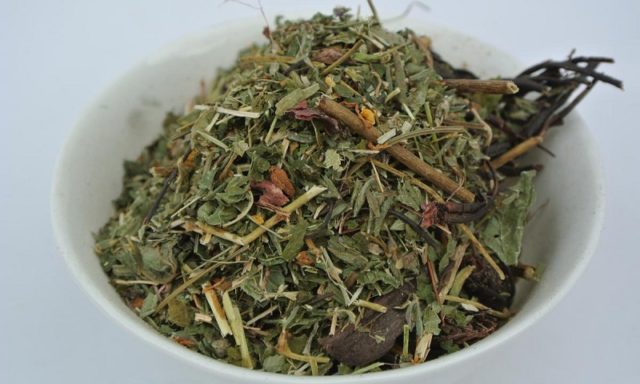
Application in cosmetology
The beneficial properties of yucca are appreciated not only by medicine, but also by home cosmetology. The houseplant has a beneficial effect on the skin, increases its firmness and elasticity, helps to get rid of the first wrinkles. The flower has a good effect on the tendency to breakouts, quickly removes acne and unclogs the pores.
For oily type of epidermis, you can prepare the following mask:
- 20 g of pure juice is squeezed out of fresh yucca leaves;
- mix liquid with raw egg white;
- bring to homogeneity;
- if necessary, slightly dilute the components with warm water or milk.
The liquid mask is evenly distributed over the face and neck, and after 15 minutes, washed off with warm water. It is advisable to repeat the procedure at least twice a week, then the effect of using a room flower will quickly become obvious.
The valuable properties of the plant allow you to strengthen weakened hair and prevent hair loss. For health purposes, prepare the following rinsing mixture:
- 15 g of chopped room yucca leaves are poured into a glass of water;
- boil over low heat until the volume of liquid is reduced by three times;
- remove the product from the stove and filter;
- add 5 ml of melted coconut oil to the broth;
- make seven drops of pomace of grape seeds.
All components are thoroughly mixed, and then distributed through the hair, lightly rubbing into the skin at the roots. The composition must be kept for 25 minutes under a film and a towel. After the expiration date, the product is washed off with a natural shampoo.
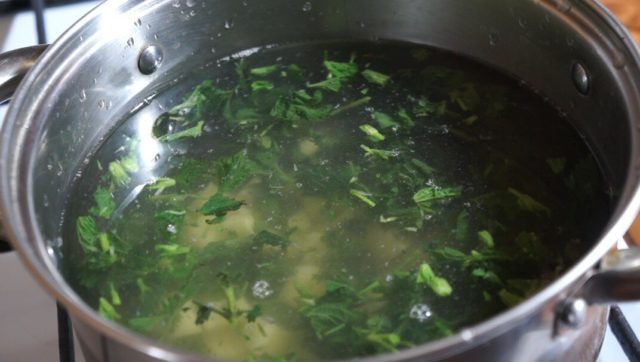
Contraindications and harm of a yucca houseplant for humans
The benefits and harms of an indoor flower depend on the individual state of the human body. Contraindications for the use of the plant are:
- pregnancy and lactation;
- the presence of allergies;
- children and adolescents up to 18 years old;
- a tendency to diarrhea;
- pancreatitis and gastric ulcer in a state of exacerbation.
The indoor flower contains substances that form hydrocyanic acid during the decay. When using herbal remedies, it is very important to adhere to the prescription dosages. If you exceed safe amounts, yucca can cause side effects - diarrhea, nausea and vomiting, migraines and dizziness. With prolonged overdose, the development of paresthesia and myelopathy is possible.
Is yucca dangerous for cats
Poisonous yucca in small quantities does not pose a threat to pets - the concentration of toxic substances in its composition is small. Despite this, it is best to keep the flower away from pets. Cats are very fond of eating houseplant leaves to induce vomiting and empty the stomach of swallowed hair.
If left unchecked, the animals can chew the yucca completely and seriously ruin its decorative appearance. It is recommended to put the flower in rooms closed from cats or place it on the balcony. To prevent pets from showing an increased interest in the plant, you can buy special germinated grass for them at the pet store.
Collection and procurement
Yucca leaves and flowers indoors and outdoors are harvested during the period of maximum decorativeness. The prepared raw materials are laid out in a thin layer on a tray or on a sheet of cardboard, and then put away in a well-ventilated and warm place until completely dry. From time to time, leaves and flowers should be agitated so that they do not mold.After the moisture has completely evaporated, the raw materials will need to be poured into a paper bag and placed in a dark, warm place.
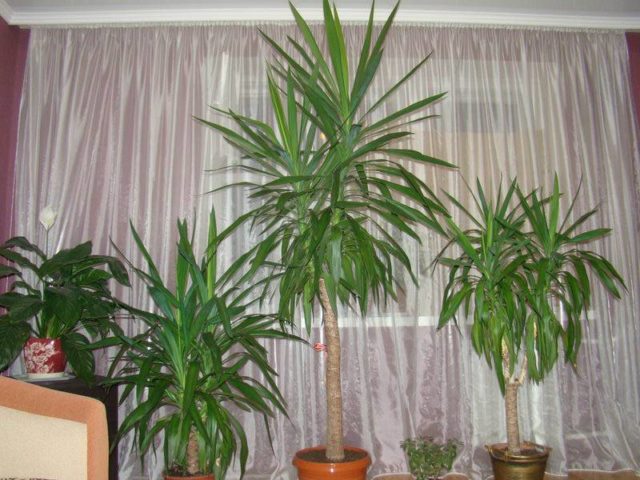
Yucca roots are dug out during the dormant period - late autumn or early spring. Drying for them is carried out in a similar way, in a warm, ventilated place. But first, the raw material must be thoroughly rinsed from soil residues.
If yucca is to be used for medicinal purposes, it is important to provide the indoor plant with conditions as close to natural as possible. With the onset of autumn, the flower is watered much less and the amount of daylight is reduced. This will allow the yucca to go into a dormant state, in which valuable substances accumulate in the underground part.
Conclusion
The benefits and harms of room yucca are closely related to each other. A lot of medicines can be prepared on the basis of a flower. But it should be remembered that yucca is poisonous, and you should carefully adhere to safe dosages.

